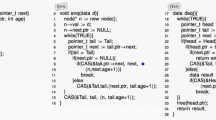Abstract
This paper describes a methodology based on dependency graphs for doing concurrent run-time error detection in systolic arrays and wavefront processors. It combines the projection method of deriving systolic arrays from dependency graphs with the idea of input-triggered testing. We call the method ITRED, forInput-driven Time-Redundancy Error Detection. Tests are triggered by inserting special symbols in the input, and so the approach gives the user flexibility in trading off throughput for error coverage. Correctness of timing is proved at the dependency graph level. The method requires no extraPEs and little extra hardware. We propose several variations of the general approach and derive corresponding constraints on the modified dependency graphs that guarantee correctness. One variation performs run-time error correction using majority voting. Examples are given, including a dynamic programming algorithm, convolution, and matrix multiplication.
Similar content being viewed by others
References
J.A. Abraham, et al., “Fault tolerance techniques for systolic arrays,”IEEE Computer, 1987, pp. 65–74.
E.S. Manolakos and S.Y. Kung, “CORP—a new recovery procedure for VLSI processor arrays,”IEEE Symp. on the Engin. of Computer Based Medical Systems, 1988.
E.S. Manolakos and S.Y. Kung, “Neighbor assisted recovery in VLSI processor arrays,”European Signal Processing Symposium, EUSIPCO '88, North Holland, 1988.
C.-C. Wu, and T.-S. Wu, “Concurrent error correction in unidirectional linear arithmetic arrays,”Proc. Int. Symp. Fault-Tolerant Computing, 1987, pp. 136–141.
R. Cosentino, “Concurrent error correction in systolic architectures,”IEEE Trans. on Computer-Aided Design, vol. 7, 1988, pp. 117–125.
L. Shombert and D.P. Siewiorek, “Using redundancy for concurrent testing and repairing of systolic arrays,”Proc. Int. Symp. Fault-Tolerant Computing, 1987, pp. 246–249.
Y.H. Choi, S.M. Han, and M. Malek, “Fault diagnosis of reconfigurable systolic arrays,”Proc. Int'l. Conf. Computer Design: VLSI in Computers, 1984, pp. 451–455.
S.Y. Kung,VLSI Array Processors, Englewood Cliffs, NJ: Prentice Hall, 1988.
H.-H. Liu and K.-S. Fu, “VLSI arrays for minimum-distance classifications”,VLSI for Pattern Recognition and Image Processing, (King-Sun Fu, ed.), New York: Springer-Verlag, 1984.
R.J. Lipton and D. Lopresti, “A systolic array for rapid string comparison,”1985 Chapel Hill Conference on Very Large Scale Integration, (Henry Fuchs, ed.), Rockville, MD: Computer Science Press, 1985, pp. 363–376.
R.J. Lipton and D. Lopresti, “Comparing long strings on a short systolic array,”1986 International Workshop on Systolic Arrays, Oxford: University of Oxford, 1986.
G.M. Landau and U. Vishkin, “Introducing efficient parallelism into approximate string matching and a new serial algorithm,”ACM STOC, 1986, pp. 220–230.
P.K. Lala,Fault Tolerance and Fault Testable Hardware Design, Englewood Cliffs, NJ: Prentice Hall, 1987.
J.F. Wakerly,Error Detecting Codes, Self-checking Circuits and Applications, New York: North Holland, 1978.
Author information
Authors and Affiliations
Additional information
This work was supported in part by NSF Grant MIP-8912100, and U.S. Army Research Office-Durham Grant DAAL03-89-K-0074.
Rights and permissions
About this article
Cite this article
Sha, E.HM., Steiglitz, K. Error detection in arrays via dependency graphs. J VLSI Sign Process Syst Sign Image Video Technol 4, 331–342 (1992). https://doi.org/10.1007/BF00930644
Received:
Revised:
Published:
Issue Date:
DOI: https://doi.org/10.1007/BF00930644




